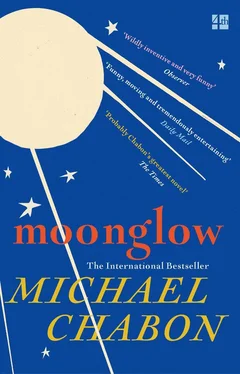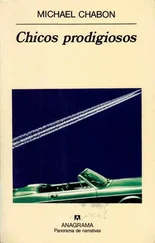The first time my grandfather saw my mother was a Sunday afternoon in early March 1947, a couple of weeks after “Night in Monte Carlo.” He rode the number 5 streetcar from his brother’s house in Park Circle to Ahavas Sholom, which was about to begin its observation of Purim. Technically, Purim had fallen on a Friday that year, but due to some Sabbath pettifoggery and the city of Baltimore not having been walled during the time of Joshua, it was to be celebrated today.
My grandfather had no interest in the Jewish calendar or Uncle Ray’s explanation thereof, and as for Purim itself, he could take it or leave it. Unlike the other Jewish holidays, it had been fun when he was a kid, and he still gave it credit for that. But somewhere between the Ardennes and the Harz mountains, my grandfather had lost the taste or the capacity for celebrating an enemy’s defeat, and it struck him as cheap and painfully mistaken to draw all the neat parallels that Ray planned to draw in his sermon between the would-be exterminator Haman and the bona-fide exterminator Hitler. Jewish wiles and bad luck (aka “God”) had put a stop to Haman’s plans; Hitler had simply run out of time.
The annual celebrations of God’s mercy, justice, and power, the feasts or fasts undertaken in praise of His Name, the miracles He was supposed to have thrown our way over the centuries—in my grandfather’s mind, it was all nullified by the thing he had not yet learned to call the Holocaust. In Egypt, in Shushan, in the time of Judah Maccabee, God had intervened to deliver us with a mighty hand and outstretched arm; big deal. When we were sent to the ovens, God had sat with His outstretched thumb up His mighty ass and let us burn. In 1947 there was, to my grandfather, one reason to continue calling oneself a Jew, to go on being Jewish before the world: as a way of telling Hitler Fuck you.
He was not on his way to Ahavas Sholom to celebrate Purim, endure his brother’s preaching, or stamp his feet every time Haman’s name was read from the Megillah. He was not even going for the hamantaschen, though naturally, he would not say no.* He was going to the synagogue that afternoon because Uncle Ray had assured him that my grandmother would be there, and my grandfather was hoping to get into my grandmother’s panties. The woman had passed through the fire without being consumed, but she had, my grandfather understood, been damaged. So he had decided that he was going to save her. Getting into her panties was a necessary first step.
From the first that was a part of his attraction to her: not her brokenness but her potential for being mended and, even more, the challenge that mending her would pose. He thought that if he took on the job of loving this broken woman, some measure of sense or purpose might be returned to his life. He thought that in mending her, he might also be mended. Ever since the late winter and spring of 1945 my grandfather had been suffering from a form of spiritual aphasia. No matter how many times he pored over them, he had trouble assigning sense or value to the things he had seen and done during the war. He had been assured many times by experts and authorities that his wartime actions had served a larger purpose and, furthermore, that some new purpose would be found for him in the after-war. Until the night he met my grandmother, he had put no credit in such assurances; now, as he returned to the synagogue on a mission of lust, he was more inclined to believe them. His lust itself felt like a form of belief.
He understood that it was possible to define the word fool as “one who takes on a job without knowing its true extent or difficulty,” but after all, that had been standard procedure in the Army Corps of Engineers. If there was anything like wisdom to be gained in this world, maybe it was to be found in the hopeful, hopeless motto of the Corps: Essayons. So, he didn’t know how big or hard a job he was getting himself into with this woman. At least he knew where to begin: with her hips pressed against him, her legs wrapped around him, her body encompassed by his arms.
* * *
Since “Night in Monte Carlo,” my grandfather had seen my grandmother three times.
The first time was as the result of a kind of reverse ambush engineered by Uncle Ray. Mrs. Waxman, recovering swiftly from the failure of the Sisterhood’s first plot to ensnare the new rabbi, had invited him to a “casual supper” at the Waxmans’ floor-through apartment in the Riviera, on Eutaw Place, to which, secretly, she had also invited my grandmother. Uncle Ray was hip by now to the conspiracy against him, however, and aware that his brother had blundered head over heels into the trap the Sisterhood had laid. Accepting the invitation, Uncle Ray showed up with my grandfather in tow, counting on a display of brotherly solicitude for the decorated vet with the thousand-yard stare to earn him the forgiveness of the Waxmans.
Awkwardnesses followed. A seating arrangement devised for pre-dinner drinks in the intimate drawing room of the vast apartment, where two Joseph Urban armchairs encouragingly faced an exceedingly narrow Hagenbund love seat, was spoiled both visually and tactically by the hasty interpolation of a crewel-work Eastlake side chair from the front parlor. Also, a leaf and a place had to be added to a kitchen table that was just the size, and had been set, for four. Also, the cook was obliged to reapportion fifty exorbitant grams of beluga caviar on the toast points with cream cheese that were the hors d’oeuvre . But the greatest awkwardness that night, undoubtedly, was my grandfather. Positioned alone on one side of the kitchen table, across from his brother and at an angle to my grandmother, he barely spoke, introduced food into his mouth at mechanical intervals, and stared at my grandmother without art or restraint. When she caught him staring, he would even more artlessly look down at the food on his plate with a show of puzzlement, as if he kept forgetting what supper was and how it was supposed to work.
What puzzled him, in fact, was my grandmother. When an engineer encounters his destiny or doom, it always takes the form of a puzzle.
The elegant girl he remembered from “Night in Monte Carlo” had been lively and cosmopolitan but odd and flighty and possibly a bit of a nut. She had, for God’s sake, zipped up his fly in a synagogue! The woman at the Waxmans’ kitchen table was no less beautiful than that girl but otherwise completely different in manner, in style, in energy. No more interested in the young rabbi than he was in her, she had chosen to wear a drab woolen suit-dress of an outmoded military cut. She filled it out nicely but could not enliven it. Her conversation was measured, tentative, careful, even grave. It gave no evidence of nuttiness. It was more polished, couched more in American English than two weeks before.
The absence of playfulness and flirtation in her manner brought out the languid solemnity of her feline face and eyes. The tangles of her hair had been combed and pinned close to her scalp and seemed more russet than auburn, with a sheen like the coat of a chestnut horse. The laugh he remembered as raspy, verging on braying, was a demure chuckle. At “Night in Monte Carlo,” my grandfather had pegged (maybe even a little bit dismissed) her as a fetching but scatterbrained gamine trying to relinquish her dark and painful history into the hands of hairstylists, dentists, and couturiers. A bird of passage, hollow-boned. The woman he met at the Waxmans’ that second evening seemed heavy at her core, subject to some crushing gravity. She was a vessel built to hold the pain of her history, but it had cracked her, and radiant darkness leaked out through the crack. When the conversation touched on the Carmelite convent where she had been hidden during the war, my grandmother’s voice grew husky. It throbbed with sadness. Uncle Ray passed her his handkerchief, and they all watched her dab at her eyes as the kitchen filled with silence and the smell of gardenia.
Читать дальше












